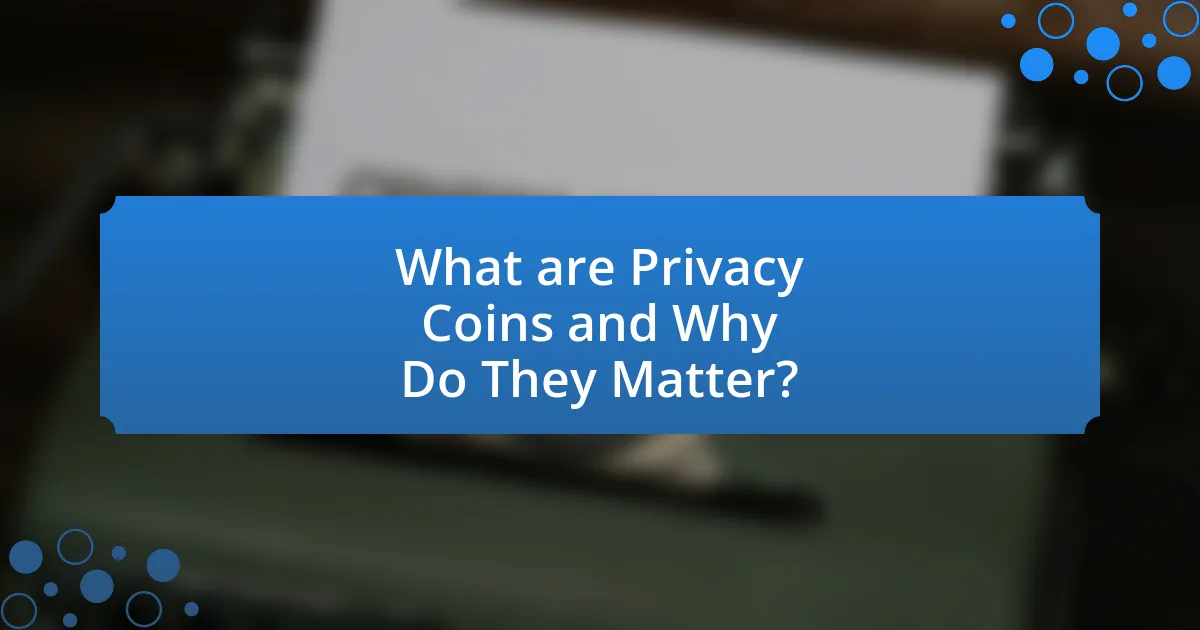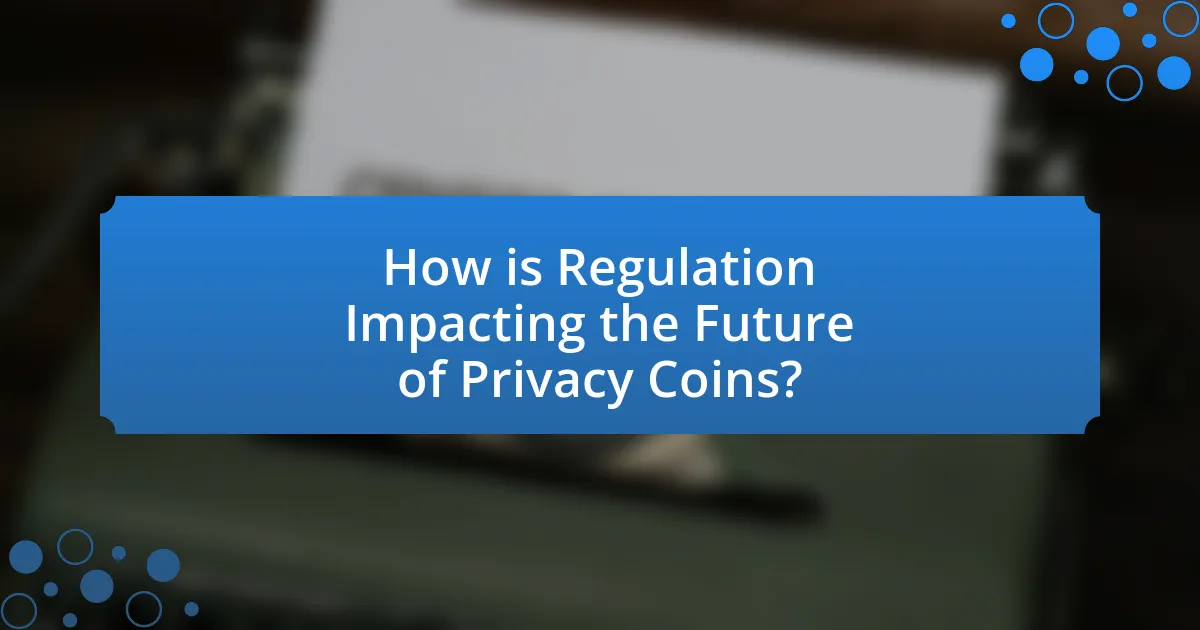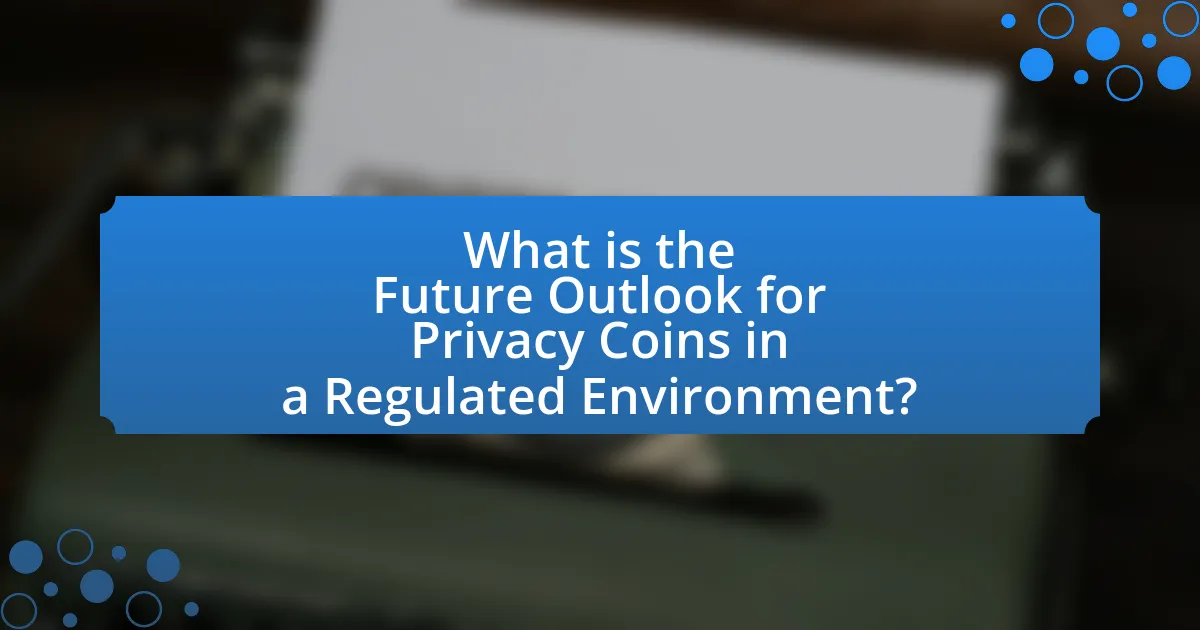Privacy coins, such as Monero and Zcash, are cryptocurrencies designed to enhance user anonymity and transaction confidentiality, addressing concerns over surveillance and data privacy in financial transactions. This article explores the differences between privacy coins and traditional cryptocurrencies, the technologies that enable their privacy features, and the importance of anonymity for users. It also examines current trends in the adoption of privacy coins across various sectors, the challenges they face due to regulatory scrutiny, and the implications of compliance for developers. Additionally, the article discusses the future outlook for privacy coins in a regulated environment, including potential innovations and strategies for users to navigate this evolving landscape.

What are Privacy Coins and Why Do They Matter?
Privacy coins are cryptocurrencies designed to provide enhanced privacy and anonymity for users by obscuring transaction details and user identities. They matter because they address growing concerns over surveillance and data privacy in financial transactions, allowing individuals to maintain control over their financial information. For instance, coins like Monero and Zcash utilize advanced cryptographic techniques such as ring signatures and zero-knowledge proofs to ensure that transaction amounts and sender/receiver identities remain confidential. This capability is increasingly relevant as regulatory bodies seek to impose stricter controls on cryptocurrency transactions, potentially threatening user privacy.
How do Privacy Coins differ from traditional cryptocurrencies?
Privacy coins differ from traditional cryptocurrencies primarily in their focus on enhancing user anonymity and transaction confidentiality. While traditional cryptocurrencies like Bitcoin and Ethereum offer a degree of pseudonymity, where transaction details are recorded on a public ledger, privacy coins such as Monero and Zcash utilize advanced cryptographic techniques to obscure transaction information, making it nearly impossible to trace the sender, receiver, or transaction amount. For instance, Monero employs ring signatures and stealth addresses to ensure that transactions remain private, while Zcash offers the option of shielded transactions that hide sender and recipient details. This fundamental difference in privacy features is crucial as it addresses growing concerns over surveillance and data privacy in the digital economy.
What technologies enable privacy features in these coins?
Privacy features in cryptocurrencies are primarily enabled by technologies such as zero-knowledge proofs, ring signatures, and stealth addresses. Zero-knowledge proofs allow one party to prove possession of certain information without revealing the information itself, enhancing transaction confidentiality. Ring signatures obscure the identities of senders by mixing their signatures with those of other users, making it difficult to trace transactions back to a specific individual. Stealth addresses generate unique, one-time addresses for each transaction, ensuring that the recipient’s address remains hidden from public view. These technologies collectively enhance user privacy and security in the cryptocurrency ecosystem.
Why is anonymity important for users of Privacy Coins?
Anonymity is crucial for users of Privacy Coins because it protects their financial transactions from surveillance and potential misuse. This protection allows individuals to maintain their privacy in an increasingly monitored digital landscape, where governments and corporations often track financial activities. The importance of anonymity is underscored by the rise of data breaches and identity theft, which have made users wary of exposing their financial information. Furthermore, studies indicate that the demand for privacy in financial transactions is growing, with a significant percentage of users prioritizing anonymity to safeguard their personal data and financial freedom.
What are the current trends in the use of Privacy Coins?
Current trends in the use of Privacy Coins include increased regulatory scrutiny, growing adoption for personal privacy, and the integration of privacy features in mainstream cryptocurrencies. Regulatory bodies worldwide are focusing on compliance, leading to a decline in the anonymity of certain privacy coins like Monero and Zcash, as they adapt to meet legal requirements. Simultaneously, individuals are increasingly seeking privacy solutions due to concerns over data breaches and surveillance, driving demand for these coins. Furthermore, major cryptocurrencies are incorporating privacy features, reflecting a shift towards enhanced user privacy in the broader crypto market.
How are Privacy Coins being adopted in various sectors?
Privacy coins are being adopted in various sectors primarily for their ability to enhance transaction confidentiality and protect user data. In the financial sector, institutions are exploring privacy coins to facilitate secure transactions while complying with regulatory requirements. For instance, companies like Monero and Zcash are being integrated into payment systems to offer users anonymity, which is particularly appealing in regions with stringent financial regulations.
In the e-commerce sector, businesses are increasingly accepting privacy coins as a payment method to attract customers who prioritize confidentiality in their transactions. A report from Chainalysis indicates that the use of privacy coins in online marketplaces has surged, reflecting a growing demand for secure payment options.
Moreover, the gaming industry is leveraging privacy coins to enable secure in-game transactions, allowing players to maintain their anonymity while purchasing virtual goods. This trend is supported by the increasing number of gaming platforms that are integrating blockchain technology to enhance user experience and security.
Overall, the adoption of privacy coins across these sectors illustrates a shift towards prioritizing user privacy and data protection in financial transactions.
What challenges do Privacy Coins face in gaining mainstream acceptance?
Privacy coins face significant challenges in gaining mainstream acceptance primarily due to regulatory scrutiny and concerns over illicit use. Governments and regulatory bodies often classify privacy coins as potential tools for money laundering and tax evasion, leading to increased oversight and restrictions. For instance, the Financial Action Task Force (FATF) has issued guidelines that require exchanges to implement strict Know Your Customer (KYC) protocols, which can limit the usability of privacy coins. Additionally, the lack of transparency associated with these coins raises concerns among potential users and investors about their legitimacy and security. This combination of regulatory pressure and public perception creates substantial barriers to widespread adoption.

How is Regulation Impacting the Future of Privacy Coins?
Regulation is significantly impacting the future of privacy coins by imposing stricter compliance requirements that could limit their adoption and functionality. Governments worldwide are increasingly focusing on anti-money laundering (AML) and know-your-customer (KYC) regulations, which challenge the core anonymity features of privacy coins like Monero and Zcash. For instance, the Financial Action Task Force (FATF) has recommended that countries regulate virtual assets, including privacy coins, to prevent illicit activities, leading to exchanges delisting these coins to comply with regulations. This regulatory scrutiny may drive privacy coin developers to adapt their technologies to meet legal standards, potentially compromising their original privacy-centric goals.
What are the key regulatory frameworks affecting Privacy Coins?
The key regulatory frameworks affecting Privacy Coins include the Financial Action Task Force (FATF) guidelines, the European Union’s Fifth Anti-Money Laundering Directive (5AMLD), and various national regulations such as the United States’ Bank Secrecy Act (BSA). The FATF guidelines emphasize the need for virtual asset service providers to implement anti-money laundering (AML) measures, which directly impacts the use of Privacy Coins by requiring transparency and traceability. The 5AMLD mandates that cryptocurrency exchanges and wallet providers register and comply with AML regulations, further constraining the anonymity features of Privacy Coins. Additionally, the BSA requires financial institutions to report suspicious activities, which can lead to increased scrutiny of transactions involving Privacy Coins. These frameworks collectively aim to mitigate risks associated with money laundering and terrorist financing while challenging the fundamental privacy principles of these cryptocurrencies.
How do different countries approach the regulation of Privacy Coins?
Different countries approach the regulation of Privacy Coins with varying degrees of acceptance and restriction. For instance, Japan has embraced a regulatory framework that allows the use of Privacy Coins while requiring exchanges to comply with anti-money laundering (AML) regulations. In contrast, countries like China have outright banned Privacy Coins, citing concerns over financial stability and illicit activities. The European Union is currently working on comprehensive regulations that may include specific guidelines for Privacy Coins, balancing innovation with consumer protection. The United States has a fragmented approach, with some states like Wyoming promoting a favorable environment for cryptocurrencies, while others impose strict regulations. These diverse regulatory stances reflect each country’s priorities regarding financial security, innovation, and consumer protection.
What are the implications of regulatory compliance for Privacy Coin developers?
Regulatory compliance significantly impacts Privacy Coin developers by imposing legal obligations that can restrict their operational capabilities. Compliance with regulations such as Anti-Money Laundering (AML) and Know Your Customer (KYC) requirements may necessitate the implementation of identity verification processes, which contradicts the fundamental privacy principles of these coins. For instance, the Financial Action Task Force (FATF) guidelines advocate for the regulation of cryptocurrencies to prevent illicit activities, leading to increased scrutiny on Privacy Coin projects. Consequently, developers may face challenges in maintaining user anonymity while adhering to these regulations, potentially diminishing the appeal of their products in the market.
Why is there a need for regulation in the Privacy Coin space?
Regulation is needed in the Privacy Coin space to prevent illicit activities such as money laundering and tax evasion. Privacy coins, like Monero and Zcash, offer enhanced anonymity, which can be exploited by criminals to obscure financial transactions. According to a report by Chainalysis, over $1 billion in cryptocurrency was sent to illicit addresses in 2020, highlighting the potential for misuse. Regulatory frameworks can help ensure compliance with anti-money laundering (AML) and know your customer (KYC) laws, fostering a safer environment for legitimate users while mitigating risks associated with anonymity.
How can regulation enhance user trust in Privacy Coins?
Regulation can enhance user trust in Privacy Coins by establishing clear legal frameworks that ensure compliance with anti-money laundering (AML) and know your customer (KYC) requirements. These regulations provide users with a sense of security, as they indicate that the coins are subject to oversight, reducing the risk of illicit activities associated with unregulated cryptocurrencies. For instance, jurisdictions that implement stringent regulations, such as the Financial Action Task Force (FATF) guidelines, demonstrate a commitment to transparency and accountability, which can foster greater confidence among users. Additionally, regulatory clarity can lead to increased adoption by mainstream financial institutions, further legitimizing Privacy Coins and reassuring users about their safety and reliability.
What risks do unregulated Privacy Coins pose to the financial system?
Unregulated Privacy Coins pose significant risks to the financial system by facilitating illicit activities such as money laundering and tax evasion. These cryptocurrencies, which obscure transaction details, can be exploited by criminals to transfer funds without detection, undermining regulatory frameworks designed to prevent financial crimes. For instance, a 2021 report by the Financial Action Task Force (FATF) highlighted that the anonymity provided by Privacy Coins can hinder law enforcement efforts, making it difficult to trace the flow of illicit funds. Additionally, the lack of oversight can lead to market instability, as unregulated assets may attract speculative trading, resulting in sudden price fluctuations that can impact broader financial markets.

What is the Future Outlook for Privacy Coins in a Regulated Environment?
The future outlook for privacy coins in a regulated environment is likely to involve increased scrutiny and compliance requirements, which may limit their adoption and use. Regulatory bodies worldwide are focusing on anti-money laundering (AML) and know-your-customer (KYC) regulations, which could lead to privacy coins being subjected to similar standards as traditional financial instruments. For instance, the Financial Action Task Force (FATF) has issued guidelines that emphasize the need for cryptocurrency exchanges to implement KYC measures, impacting the operational landscape for privacy coins. As a result, while privacy coins may continue to exist, their functionality could be constrained by regulatory frameworks aimed at enhancing transparency and reducing illicit activities.
How might Privacy Coins evolve in response to regulatory changes?
Privacy coins may evolve by incorporating enhanced compliance features to meet regulatory requirements while maintaining user anonymity. As governments increase scrutiny on cryptocurrencies, privacy coins like Monero and Zcash could implement optional transparency layers that allow users to disclose transaction details to regulators without compromising overall privacy. This adaptation aligns with trends observed in the cryptocurrency market, where projects have begun to prioritize regulatory compliance to avoid bans or restrictions, as seen with the introduction of KYC (Know Your Customer) protocols in various exchanges. Additionally, privacy coins might develop hybrid models that balance privacy and transparency, ensuring they remain viable in a landscape increasingly shaped by regulatory frameworks.
What innovations are being developed to ensure compliance while maintaining privacy?
Innovations being developed to ensure compliance while maintaining privacy include zero-knowledge proofs, which allow transactions to be verified without revealing the underlying data. This technology enables privacy coins to demonstrate compliance with regulations, such as anti-money laundering (AML) and know your customer (KYC) requirements, without disclosing sensitive user information. For instance, zk-SNARKs (Zero-Knowledge Succinct Non-Interactive Arguments of Knowledge) are being integrated into various blockchain platforms to facilitate this balance between privacy and regulatory adherence. Additionally, regulatory frameworks are evolving to incorporate privacy-enhancing technologies, allowing for the use of privacy coins in a compliant manner while safeguarding user anonymity.
How can Privacy Coins coexist with traditional financial systems?
Privacy coins can coexist with traditional financial systems by integrating regulatory compliance measures that enhance transparency while preserving user anonymity. For instance, privacy coins can implement features like selective disclosure, allowing users to share transaction details with regulators without compromising overall privacy. This approach aligns with the Financial Action Task Force (FATF) guidelines, which advocate for a balance between privacy and anti-money laundering (AML) efforts. Additionally, partnerships between privacy coin developers and financial institutions can foster innovation, enabling the development of compliant products that leverage the benefits of both systems. Such collaborations can lead to the creation of hybrid models that satisfy regulatory requirements while maintaining the core principles of privacy coins.
What strategies can users adopt to navigate the evolving landscape of Privacy Coins?
Users can adopt several strategies to navigate the evolving landscape of Privacy Coins, including staying informed about regulatory changes, utilizing reputable wallets and exchanges, and employing privacy-enhancing tools. Staying informed allows users to understand the legal implications and compliance requirements associated with Privacy Coins, as regulations are continuously evolving globally. Utilizing reputable wallets and exchanges ensures that users engage with platforms that prioritize security and compliance, reducing the risk of legal issues. Employing privacy-enhancing tools, such as mixing services or decentralized exchanges, can further enhance anonymity while transacting with Privacy Coins. These strategies collectively empower users to make informed decisions and mitigate risks in a complex regulatory environment.
What best practices should users follow to ensure their privacy while using these coins?
Users should utilize privacy coins by following best practices such as using a secure wallet, employing mixing services, and maintaining anonymity in transactions. A secure wallet, preferably a hardware wallet, protects private keys from unauthorized access, reducing the risk of theft. Mixing services enhance privacy by obfuscating transaction trails, making it difficult to trace the origin of funds. Additionally, users should avoid sharing personal information linked to their transactions and consider using VPNs or Tor to mask their IP addresses, further safeguarding their identity. These practices are essential as they help mitigate the risks associated with surveillance and data breaches in a regulated environment.
How can users stay informed about regulatory changes affecting Privacy Coins?
Users can stay informed about regulatory changes affecting Privacy Coins by regularly following updates from reputable financial news sources, government publications, and cryptocurrency regulatory bodies. Subscribing to newsletters from organizations like the Financial Action Task Force (FATF) and monitoring announcements from the U.S. Securities and Exchange Commission (SEC) can provide timely information. Additionally, engaging with community forums and social media channels dedicated to cryptocurrency discussions can help users share insights and updates. Research indicates that staying connected with these sources enhances awareness of evolving regulations, as seen in the increased scrutiny of Privacy Coins by regulators in recent years.


